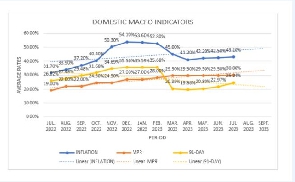As the clock ticks toward the release of August 2023 inflation figures today, there is growing anticipation that headline inflation will extend its upward trajectory for the fourth consecutive month – marking a worrisome trend since May of this year.
After recording disinflation in the first four months, Ghanaians have had to grapple with an acceleration in the rate from May to July 2023. The surge in inflation since May 2023 can be attributed to a combination of factors, including the impact of new revenue interventions, upward adjustments in utility tariffs and persistent food price pressures.
While the initial effects of the revenue measures may be waning, the incessant surge in food prices continues to exert upward inflationary pressure; partially offsetting the favourable base effect observed since May 2023.
Elevated food costs have emerged as a significant driver of inflationary pressure, with August marking the third consecutive month of price increases; casting shadows over the country’s economic outlook in the coming months.
One major concern regarding the anticipated increase in August’s headline inflation is its potential impact on the broader economy. Apakan Securities, in its analysis of August inflation data, has expressed concern that this year’s unfavourable food harvest season – driven by climate change and rising input costs – could significantly contribute to further inflationary pressures.
This concern is further exacerbated by the recent surge in ex-pump petroleum prices, driven by the relentless rise in Brent crude oil prices on the global market.
“We anticipate an uptick in headline inflation for Aug-2023, underpinned by the increase in ex-pump petroleum prices and lingering food cost pressures due to expected unfavourable harvest seasons this year,” noted Apakan Securities.
The persistent surge in inflation can largely be attributed to escalating costs of food items, particularly cereal products and meat. Data from the Ghana Statistical Service (GSS) reveal that headline inflation climbed to 43.1 percent year-on-year in July 2023 from 42.5 percent year-on-year in June 2023.
The Consumer Price Index (CPI) for the same period surged by 3.60 percent month-on-month in July, having earlier seen a slight decline to 3.20 percent in June. Food inflation, a significant driver of the overall inflation rate, surged from 54.20 percent year-on-year in June 2023 to 55 percent year-on-year in July 2023; thus continuing its upward trajectory.
As the nation grapples with these complex inflationary dynamics, experts are closely monitoring the potential consequences for monetary policy. Constant Capital, in its review of the July 2023 inflation data, predicted a resumption of the disinflation trend in the near-term – albeit with lingering concerns over persistent food price pressures. The forthcoming major staple crop harvesting season in August and September is seen as having potential to tame food price pressures.
Meanwhile, GCB Capital – another market watcher – is taking a more cautious stance, emphasising that food inflation remains a significant risk to the overall inflation outlook. The food basket’s contribution to the nation’s inflation average has consistently hovered around 55 percent… remaining above the national average.
The potential relief offered by an imminent main crop harvest season is balanced against the second-round effects of surging food prices since May 2023 and proposed quarterly utility tariff adjustments.
“We expect Ghana’s headline inflation to increase for the fourth consecutive month following the reversal in inflation trend since May 2023. Inflation has increased since May 23, induced by the price effects of new revenue interventions, upward utility tariff adjustments and food price pressures. While effects of the revenue measures may be wearing off, relentless food prices have sustained the upward inflation pressure and moderated the impact of a favourable base drift since May 2023,” GCB Capital projected.
Consequently, experts believe the August inflation data could potentially sustain the uptick in yields, given the Treasury’s continued reliance on short-term funds.
The path ahead for the economy remains uncertain, with inflation posing a formidable challenge. All eyes are on today’s release of the August 2023 inflation figures, which could provide critical insights into the country’s economic trajectory.
Business News of Wednesday, 13 September 2023
Source: thebftonline.com

















